- Home
- Pat Conroy
The Death of Santini Page 28
The Death of Santini Read online
Page 28
Carol Ann started haranguing Stanny about the rights of women and the history of women’s liberation, ending with a thrilling, “Stanny, when you were born, women weren’t even permitted to vote.”
“Listening to you run your mouth tonight, I kinda see the point,” my mother said unhelpfully.
The mother and daughter exercise flared up again, and I jumped between the antagonists and kept them away from each other. Both women were ready to claw each other’s eyeballs clear out of their heads, and they were trading epithets that were growing more profane by the second. I saw Barbara moving the kids out of the battle zone and I heard my grandmother say something that seemed irrelevant to the intellectual social discussion that was under present review:
“Carol Ann’s never even been to Beirut.”
When I got Carol Ann to retreat to the doorway, near where she and Chris held hands and Mom was sitting again facing Stanny, I assumed my natural role of peacemaker between the two women. It had been my role since I was a child.
“Let’s discuss this calmly,” I said.
Carol Ann rolled her eyes and said to Chris, “This is the part of my brother I hate the most. The kindly one. The Goody Two-shoes. The perfect one. U Thant. The ambassador to the peaceful kingdom.”
“Shut up, Carol Ann,” I said, “or I’ll beat the living shit out of you and leave you for dead.”
“That’s what he really wants—to silence womanhood,” she declared. “To threaten us with bodily harm. But I’m telling you this right now, buster: Womanhood won’t be tamed or condescended to or have our mouths taped shut again. We are billions and we are on the move.”
“Before I tape your mouth shut, Carol, I’d like to say something to you,” I said.
“Say it,” she said.
“You’re my oldest sister. You and I grew up together. Learned to read together. You know I adored you and admired you from the time I was a little boy to this very night. We’re as close as any brother and sister I’ve ever met. I think you are a great poet and great person.”
“Cut the bullshit,” Carol Ann said. “Get on with it.”
“You’ve had a difficult life in a difficult family. But you and I survived. By staying together, you and I got through the worst of things. We did it by loving and trusting each other. Trust me now. Mom will get over it. Stanny judges no one. Your brothers and sisters all love you like I do, like Mom does. But I don’t think you stage-managed this announcement very well. I believe it could be done in private. But if you’re a lesbian, I’ll accept it. If you love Chris Cinque, I’ll love Chris. So will your family. Except for Dad. You’re on your own with Dad. He could kill you for all I know. I don’t even know what lesbians do to each other and I don’t care. But if that’s who you are, I’m fine with it. I support it and I hope you’re happy the rest of your life.”
Carol Ann threw herself into my arms and both of us trembled with emotion. Then I led Carol Ann to Mom and they embraced each other and cried. I hugged Chris and the whole room restored itself into a quiet equilibrium.
Later that evening, still in the kitchen, we were at the table talking about that day’s events. I was curious about something and I asked Carol Ann, “Why this lightning strike, Carol Ann, why this blitzkrieg into Beaufort, bringing us these tidings of good joy?”
Carol Ann and Chris were at the sink washing dishes, and she said, “I had to work fast. I needed to tell you tonight because I’m insisting that Chris be included in the family photograph we send to Dad.”
My mother exploded beside me. “Over my dead body! She’s not a member of our family and she never will be.”
“She’s a member of my family, and I say she’ll be in this photograph,” Carol Ann retorted. “Or I’ll refuse to be in it.”
“That’s fine with me, young lady,” my mother snarled.
“I’ve never heard of such a thing,” Stanny said. “A lesbian in a Southern family photo.”
“Quiet, Stanny,” I said. “Don’t get yourself involved in this. Carol Ann, are there any more surprises? Any more hand grenades you want to lob into this kitchen?
“No. That’s the last one,” she said. “But I resent you calling my lover a hand grenade.”
“Mom,” I said as I pulled up a chair beside her, “this is just a photograph. Dad won’t even notice there’s someone else in the picture. Tell him Carol Ann’s roommate was down for the weekend and we wanted to see if he even noticed a stranger in the family lineup. It doesn’t have to be a big deal.”
“It’s a big deal to me,” Mom said.
“Ladies, ladies, ladies,” I began, then stopped, tongue-tied, and couldn’t think of one thing to say, but out of perverse frustration I said, “Mom, Chris is going to be in our goddamn family portrait or I’m not going to be; nor will any of the other kids.”
“You can’t make an ultimatum like that,” my mother said.
“I just did, and I meant every word of it.”
Carol Ann turned to Chris and said, “Golden boy comes through again.”
“It’s just not right,” my mother said, but with an echo of surrender in her voice.
Later, in the living room, we gathered for a glass of wine before we went to bed. It had been a hard day in the Conroy household, but we were long accustomed to high drama and angry voices. We were battle-scared veterans of many fractious skirmishes of both the body and spirit. The wounds of the night would heal and the tempers would be smoothed by sleep and darkness.
But Carol Ann asked my mother whether there was anything about lesbianism that troubled her, or whether she and Chris could answer any questions that would set her mind at ease.
My mother thought about it, then said, “Yes, I’ve always been curious about lesbianism.” I had never heard her mention the word in my entire life. “There is something I’d like to know. When you and Chris make love, if that’s what you call it—”
“That’s what we call it, Peggy,” said Chris.
“Well, whatever, but when you do to each other what you do, who takes the ‘male’ role? You or Chris?”
“We don’t play roles like that,” Carol Ann explained.
“Oh, come on. You asked if I was interested or not, and I’d just like to know which one of you plays the male aggressor, who makes the aggressive animal-like moves toward the more feminine of the two.”
Finally, Carol Ann had come to the end of her patience, and she stood up and put her jackbooted foot up on the arm of Mom’s chair. She rolled up the cuff of her overalls to the knee, tightened the muscles in her arms, and growled with apelike ferocity, “Mother, it’s me.”
My mother fled out into the night.
The next day we arrived at Ned Brown’s studio for our family portrait. It remains, by far, my favorite family portrait. One can study the clothing styles and the haircuts of that unlovely era. Take your time doing it. In that pyramid of faces, I see much of my life passing by in review. The long hair on the boys I attribute to my mother’s not handing out money to pay for haircuts more than I do to the sixties. The cheap eyeglasses on the boys are one of my mother’s trademarks. My brother Tim’s shirt belongs in a museum somewhere. Mom is radiant after the tumultuous dinner at my house the evening before. Always, when I see my lost brother, Tom, there is a heartache that’ll never heal. My children and my wife are lovely and I look happy.
Yet the centerpiece of the entire photograph will be Chris Cinque, with her slight Mona Lisa smile as she sits separated by a resilient sea of Conroys from her lover, Carol Ann. Though they broke up more than thirty years ago, I still love the moment when a distant cousin or an old friend tries to match the fresh faces in the photograph with the older faces we now carry around with us. Most of them can identify every one of them with a little bit of help, but they’re flummoxed by the mysterious stranger who anchors the left flank of the photo.
Though I’ve told this story hundreds of times over the years, I never cracked the case about what Stanny meant by saying that Carol Ann
had “never even been to Beirut.” Years later, when I took Stanny to lunch at Morrison’s Cafeteria in Atlanta, she and I were talking about the family when she brought up the subject of Carol Ann and her love life.
“She don’t still insist on calling her own self a lesbian, does she now?” Stanny asked.
“She sure does,” I said. “And it’s still a sensitive subject with her.”
“Does she now? Well, she’s making a fool of herself if you happen to ask me.” Stanny ate her food as slowly as a manatee. Then she said again, “Carol’s never been to Beirut.”
“What do you mean by that, Stanny?” I said. “Who cares if you’ve been to Beirut or not?”
“Pat, it only makes sense if you look at it literally. Only people who’re from Lebanon can be real lesbians.”
I hollered with laughter and drew some unwanted attention to our table. “I get it, Stanny. I finally get it. Growing up in Piedmont, they taught you that people from Lebanon were called lesbians.”
“That’s what they’re called everywhere,” Stanny said, not giving an inch. “It’s not just Piedmont. Carol’s people are Scotch-Irish on my side of the family and pure Irish on your daddy’s side. She needs to learn these things, needs to study a little geography.”
• • •
Following Chris northward, Carol Ann audited courses at the Iowa Writers’ Workshop, where Chris majored in the theater arts. Moving to Minneapolis afterward, both established themselves in the arts community of that good-hearted city. Carol Ann’s drift out of our family circle became almost complete, even though I took my young daughters to vacation with my sister and Chris at the north shore of Lake Superior for three summers in a row. During our last summer there, Carol Ann informed me that she would no longer call herself Carol Ann, that no one in the cutthroat world of poetry would take a double-named Southern woman seriously.
Eventually, Carol Ann and Chris drifted apart, and all the Conroys mourned the loss of Chris. Carol Ann moved to start a new life in the New York poetry world, and has befriended poets as distinguished as Sharon Olds and Galway Kinnell. Her family sees her now at funerals and weddings, but she mostly spends her time in the East Village, where the smells of curry and tandoori chicken spice the air leading to the East River. Though Carol Ann was born with a greater verbal gift than I possess, her poems form as slowly as Ming vases in her cunning hands. Her light-infused poems are webs of silk and gossamer. She condenses the Conroy freight down to a cell of light and a pearl of black sorrow.
Basically, Carol Ann has not talked to me since the death of our mother in 1984, and our brother ten years later. Though I don’t like the silence that has sprung up between us, I know it’s all part of living a high-strung and troubled life. It’s also a part of being the brother of a poet.
CHAPTER 17 •
Escape from San Francisco
When I grew up, I found the word “father” to be an obscenity. Dad’s cruelty was a mass of the catechumens for me, a religious protocol that became confused in my mind with the unimaginable suffering of the Catholic martyrs. I confused God the father with the terrible reign of suffering that the Great Santini brought to the art of fathering. He bewildered his children by failing to know a single one of us. Then, after Tom’s suicide, he seemed to understand in a sudden rush of prescience and light how desperately he needed us.
My mother’s divorcing him had torn my father apart. None of us quite knew how crazy in love he was with Peg. The completeness and integrity of that devotion came to us only in the shock of her leavetaking. His face was dark with her abandonment for the rest of his life. Though he expressed great puzzlement over her dereliction of duty, I tried to make her reasons clear to him when he arrived for his daily coffee at my apartment on Maddox Drive in Atlanta from 1976 to 1980, when we lived near each other.
“Why’d you beat her up?” I’d ask him in the privacy of my living room.
“I never touched your mother in her life,” he said. “That’s bullshit you made up to sell your books.”
“I remember lots of times you slapped her around,” I said. “So does she.”
“When people invent lies about you,” Dad said, “what’re you supposed to do? How do you go about protecting yourself?”
“Admit you did it,” I said. “Come clean, Dad. Confession is good for the soul. That’s what our silly-ass church preaches.”
“Kathy doesn’t think I ever touched your mother,” he said. “She thinks you made it all up.”
“Why did she testify under oath that you beat Mom up, then?” I asked. “She was the only one of your kids to testify against you in the divorce case. I’m still ashamed of myself for not telling the court what a prick you’d been.”
“I could’ve sued you for character assassination for that shitty book you wrote about me,” he said.
“I get the night sweats when you make threats like that, Dad.”
He laughed and said, “The only reason I hold off on litigation, jocko, is my love for the magnificent seven, my great bunch of kids. Remember, high culture came out of my joint. Two writers out of seven kids—it ain’t bad. And remember, too, I fathered a poet. I’m betting that Carol kicks your ass when all is said and done. She thinks you write for the poor idiot who reads just to pass the time away. She and her friends have much higher aspirations. To tell you the truth, I think your sister’s really onto something. I like her poetry a hundred times better than your prose, which I personally think is horseshit.”
“Dad, I’m impressed you’re so enamored with her poetry. May I ask you to name your favorite poem she’s written?”
“I’ve got to think,” Dad said. “I love all her shit.”
“Just name one, proud father of poets,” I said.
Dad began to laugh. He had a wonderful laugh when he was caught in the open, after carrying a conversation to a height he couldn’t come down from. He delighted in speaking about his passion for literature, but loved even more when he found himself exposed as a preening, empty vessel.
For the rest of his life, I would listen to Dad give his saturnine view of books he’d never read and poetry he never knew existed. By then, Dad thought of himself as a literary figure, a surprise ranking that no one enjoyed more than he did.
In those years, I said terrible things to my father. When I think about the things I said to Don Conroy, I understand that I shamed myself with my own immense capacity for a murderous litany of the crimes he committed against his family. To his credit, Dad absorbed these daily attacks with patience and alacrity. Some days I was pouring it on with such violence that I found myself standing over him, screaming. Though I was trying to unleash the dark secrets he carried inside him, I was letting myself display a bloodletting portrait of the scar tissue covering my own soul. By holding my father accountable, I was offering irrefutable proof that I was his most violent son. By confronting Dad, I exposed myself and my flawed, incorrect view of myself as a softer, more sensitive version of my father.
My rage would engulf me and I’d lose my temper so many times, I failed to bring any relief to the existential suffering that overwhelmed me. So many times, I exhausted myself. I found hatred leaching me of both energy and hope. When I finished and collapsed back again in my chair, my anger was spent for the day. Dad waited for my seizures of spirit to run their course; then he would break his own code of silence and say, “Is the morning lecture over, sports fans? Surely you can drum up one more a-trocity that your poor old dad used to torture his poor family with. Surely there’s something you’ve left out. Maybe I popped you on the fanny after you practiced for First Communion. There must be something you left out.”
“I’ll think of it tomorrow,” I said.
“You make me out to be some o-gree. The other kids think you’re full of crap. Though it goes against my better nature, I’ve got to believe my other kids are onto something. Carol says you’ve got a bad case of writer’s angst,” Dad said.
“What do you mean by ‘angst’
?” I asked him.
“Ha, thought you had me on that one,” Dad said, roostering with pleasure. “Angst is what a writer feels when he can’t write worth a shit.”
Always Dad could bring an end to these morning matinees by making me laugh. He had an instinct for deflating a pretentious quality I brought to my complaints. Though I thought I was calling on my father to defend and explain himself, Dad outlasted me by the stubbornness he brought to denial. Never once did he admit to abusing us. Nor do I think I ever lit a fire on his shallow trench of emotions. He would listen to my grievances with a disinterested look in his cornflower-blue eyes—those extraordinary eyes that brought nightmares to the daydreams of North Korean infantry trying to establish bridgeheads on rivers whose names meant nothing to Americans. There was something staunch and heroic about his reaction to my version of the story of our life. I thought during these overcaffeinated sessions that I’d uncover every flaw in his line of defense. Instead, faced with his steadfastness, I exposed every single thing I hated about myself. On leaving, Dad would say, “Same time tomorrow. Try to work up some new material, jocko.”
It was during those years that I discovered parts of our life I could tell Dad that would delight him. To my absolute dismay, I seemed to be one of the only members of my family who recalled anything of our history together. What the Conroys brought to memory was all erasure and blank slates. But I remembered some happy or funny times that pleased Dad.
“Do you remember the time you were in the bathroom and our box turtle moved out to crawl on your shoe? You screamed like a python had wrapped around your leg.”
“Give a guy a break. Your mother and you were village weirdos about bringing beasts into the old domicile,” Dad said. “I was a city boy, and I thought your mother was nuts about snakes and shit like that.”
My mother had a fixation on snakes that I remember from a very young age. Because I was close to Grandpa Peek, I knew a lot about my mother’s upbringing in the primitive Baptist Church. She never mentioned the Baptist Church when she raised her seven children, and it remained an area of obscurity in our spiritual makeup.

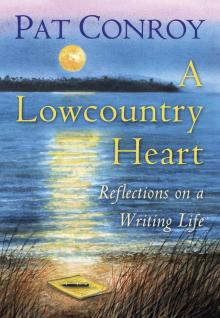 A Lowcountry Heart: Reflections on a Writing Life
A Lowcountry Heart: Reflections on a Writing Life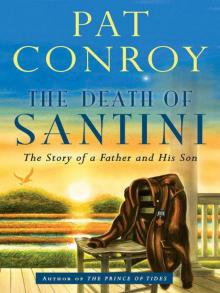 The Death of Santini: The Story of a Father and His Son
The Death of Santini: The Story of a Father and His Son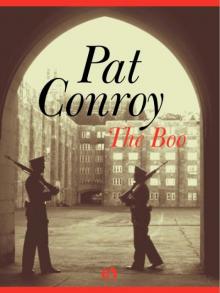 The Boo
The Boo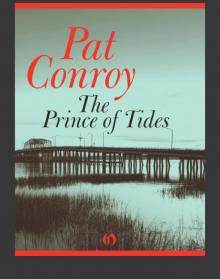 The Prince of Tides
The Prince of Tides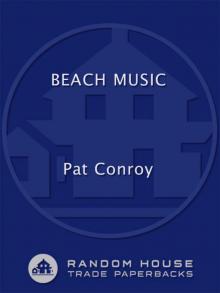 Beach Music
Beach Music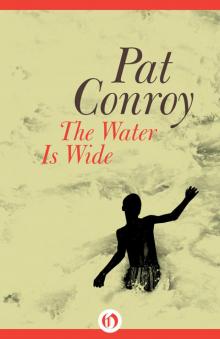 The Water Is Wide
The Water Is Wide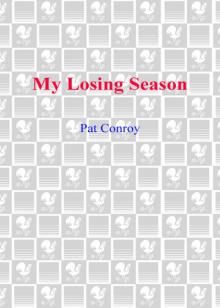 My Losing Season
My Losing Season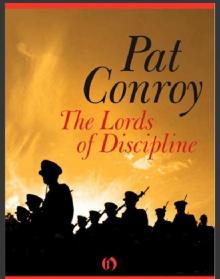 The Lords of Discipline
The Lords of Discipline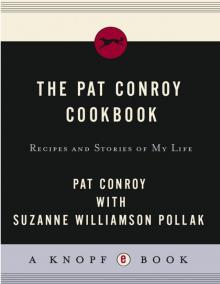 Pat Conroy Cookbook
Pat Conroy Cookbook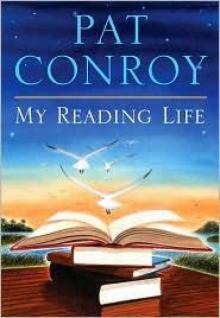 My Reading Life
My Reading Life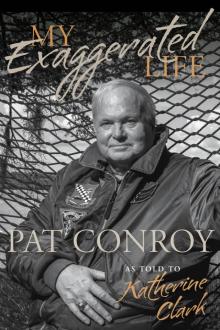 My Exaggerated Life
My Exaggerated Life The Pat Conroy Cookbook
The Pat Conroy Cookbook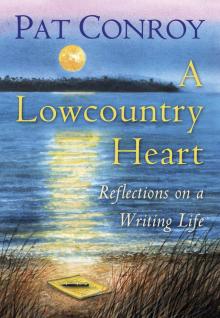 A Lowcountry Heart
A Lowcountry Heart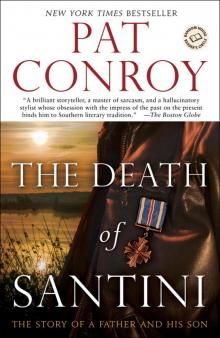 The Death of Santini
The Death of Santini